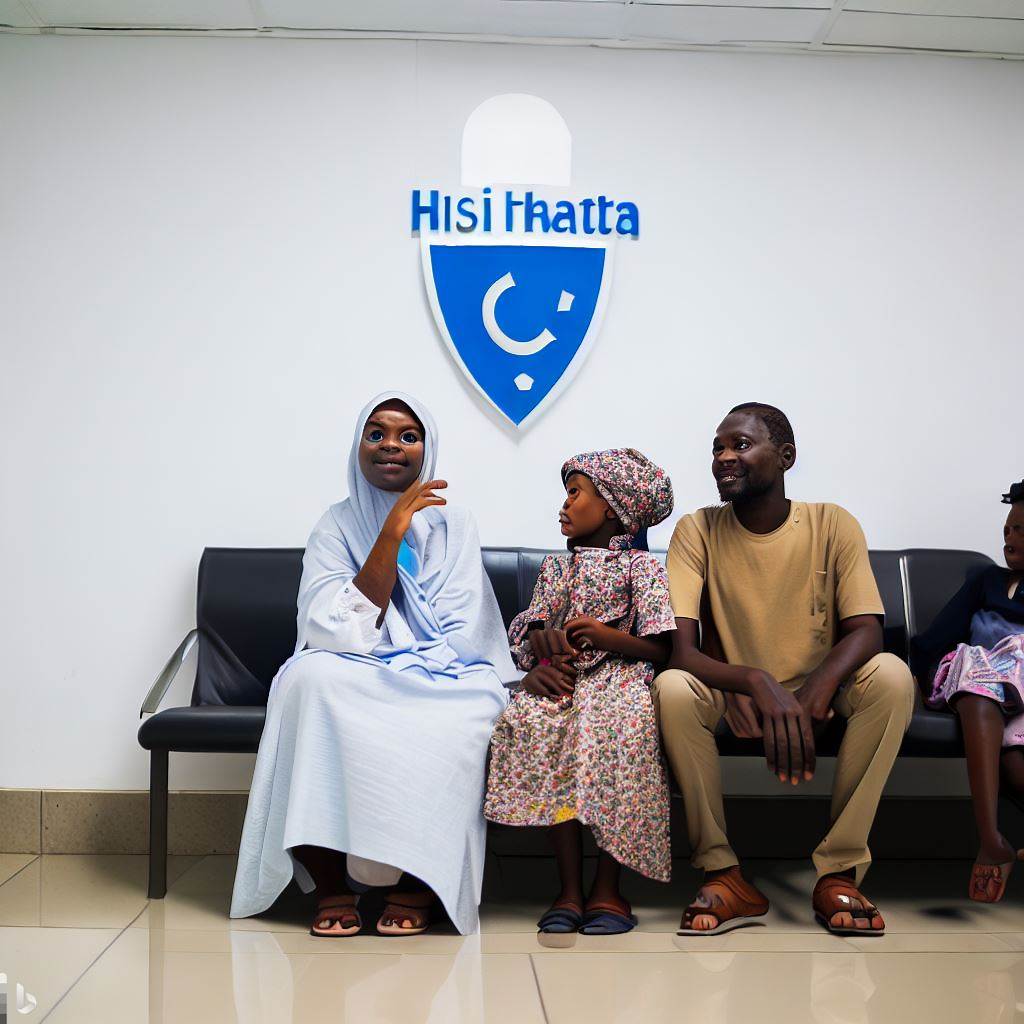Health Insurance in Nigeria: Why It’s Crucial
Last Updated on July 21, 2023
Introduction
Health insurance, a contract to cover medical costs, provides financial security during health crises. It’s a lifeline, protecting millions from exorbitant healthcare fees.
Nigeria’s healthcare system struggles with inconsistent quality and access. Less than 10% of Nigerians possess health insurance. This contributes to high out-of-pocket expenses, fueling health inequality.
This blog aims to:
- Highlight health insurance’s necessity.
- Discuss the Nigerian healthcare landscape.
- Advocate for widespread insurance adoption.
In Nigeria, health insurance isn’t a luxury; it’s a necessity. Enhancing awareness can bridge the insurance gap, catalyzing better health outcomes for all Nigerians. Let’s dive into this vital topic together.
Current healthcare challenges in Nigeria
Nigeria grapples with severe healthcare challenges. These challenges are intricate and multi-layered, severely limiting access to quality healthcare services, escalating healthcare costs, and intensifying the impact of poverty.
Limited Access to Quality Healthcare Services
Firstly, Nigerians face limited access to quality healthcare services. The underlying reasons include shortage of skilled medical personnel, lack of medical infrastructure, and uneven distribution of health facilities.
Nigeria’s doctor-to-patient ratio presents a worrying picture, with one doctor catering to an overwhelming number of over 5,000 patients.
A stark contrast to the World Health Organization’s recommendation of one doctor for every 600 individuals. The scarcity of skilled healthcare workers obstructs access to quality medical care.
Moreover, the lack of medical infrastructure exacerbates this issue. Many rural regions have minimal to non-existent health facilities.
This lack of access often compels patients to seek care from unqualified practitioners, compromising the quality of treatment received.
Additionally, health facilities are unequally distributed across the country. Urban areas often have better access, leaving rural communities with limited or no access. This urban-rural disparity creates a vicious cycle, continually denying quality healthcare to the rural populace.
Rising Healthcare Costs
Secondly, the rising cost of healthcare in Nigeria presents a significant challenge. Prices for medications and services have soared in recent years, making healthcare inaccessible for many.
Frequently, the cost of essential drugs and medical services is beyond the means of the average Nigerian. Not only are the prices exorbitant, but they are also often unpredictable, further complicating the issue.
Moreover, the high cost of medical care often forces Nigerians to delay seeking treatment, leading to late-stage diagnoses. This delay consequently increases the cost and complexity of treatment, creating a perpetual cycle of healthcare inaccessibility.
High Prevalence of Poverty and Inability to Afford Medical Expenses
Finally, the high prevalence of poverty compounds the healthcare challenge in Nigeria. A significant portion of the population lacks the financial resources to afford medical expenses.
Over 40% of Nigerians live below the poverty line, unable to afford even basic healthcare. As a result, many avoid seeking necessary medical help.
Additionally, out-of-pocket expenses for healthcare in Nigeria are some of the highest worldwide. These costs impose a heavy financial burden, especially on those living in poverty.
Further compounding the issue, Nigeria’s health insurance coverage remains low, with less than 5% of Nigerians having access to health insurance. This lack of coverage leaves a vast majority bearing the full brunt of medical expenses.
In essence, the current healthcare landscape in Nigeria presents significant challenges. These encompass limited access to quality healthcare, escalating healthcare costs, and the prevalence of poverty.
Tackling these issues will require concerted efforts, innovative solutions, and substantial investments in the healthcare sector.
This will ensure Nigerians have access to affordable, quality healthcare, a fundamental human right.
Read: The Role of Insurance in Nigeria’s Financial Planning
Importance of health insurance for individuals
Financial protection against unexpected medical expenses
Health insurance provides individuals with financial security in case of unexpected medical expenses.
It ensures that individuals do not have to bear the burden of expensive healthcare treatments and medications.
Having health insurance allows individuals to focus on their recovery rather than worrying about the cost.
Access to a wider range of healthcare providers and facilities
Health insurance provides individuals with the opportunity to choose from a larger pool of healthcare providers.
With health insurance, individuals can visit doctors, specialists, and hospitals that may have been beyond their reach otherwise.
This gives individuals the freedom to choose the healthcare professional and facility that best suits their needs.
Improved quality of healthcare services
Health insurance encourages competition among healthcare providers, leading to an overall improvement in the quality of healthcare services.
Hospitals and doctors strive to provide the best possible care to attract health insurance beneficiaries.
This results in better medical facilities, advanced technology, and a higher standard of care for individuals.
Preventive care and early detection of diseases
Health insurance often covers preventive care measures such as vaccinations, screenings, and regular check-ups.
This promotes early detection of diseases and increases the chances of successful treatment. Regular screenings and preventive care help identify health issues before they become severe and costly to treat.
Individuals can take proactive measures to maintain their health, resulting in a healthier and happier life.
Read: Retirement Plans: The Role of Insurance in Nigeria
Benefits of health insurance for Nigerian society
Reduced burden on the public healthcare system
- Health insurance helps alleviate the burden on the already overwhelmed public healthcare system.
- With health insurance, individuals have access to private healthcare providers, reducing the strain on public hospitals.
- This leads to shorter waiting times, better quality care, and improved overall healthcare outcomes for Nigerians.
Improved healthcare infrastructure development
- The presence of health insurance encourages investment in healthcare infrastructure.
- Insurance providers need a network of healthcare facilities to cater to their policyholders.
- As a result, new hospitals, clinics, and other medical facilities are established, enhancing the healthcare system in Nigeria.
Efficient allocation of healthcare resources
- Health insurance ensures that healthcare resources are allocated more efficiently.
- Insurance companies negotiate rates with healthcare providers, resulting in a fair and standardized pricing system.
- This prevents overcharging and promotes equitable distribution of resources across the country.
Increased productivity and economic growth
- Health insurance plays a vital role in improving productivity and driving economic growth.
- Insured individuals are more likely to seek timely medical attention, reducing the impact of illnesses on their productivity.
- By preserving the health of Nigerians, health insurance contributes to a more efficient workforce and overall economic development.
Generally, health insurance in Nigeria provides several benefits to society. It reduces the burden on the public healthcare system, improves healthcare infrastructure development, promotes efficient allocation of resources, and leads to increased productivity and economic growth.
Implementing widespread health insurance coverage is crucial for the betterment of Nigerian society and the overall well-being of its citizens.
Read: The Role of Insurance in Nigeria’s Financial Planning
Challenges and limitations of health insurance in Nigeria
Low awareness and understanding of health insurance
- Lack of education and information about the importance and benefits of health insurance.
- Limited dissemination of knowledge on the various health insurance options available.
- Misconceptions and myths surrounding health insurance leading to skepticism among the population.
Affordability and limited coverage options
- High premium costs making health insurance unaffordable for many Nigerians.
- Limited coverage options, with insurance plans often not covering certain medical conditions or treatments.
- Lack of comprehensive coverage for preventive care, leading to inadequate healthcare access.
Inadequate regulatory framework and enforcement
- Weak regulatory environment with inadequate oversight and monitoring of health insurance providers.
- Lack of strict implementation of regulations, allowing for unethical practices such as insurance fraud and denial of claims.
- Insufficient penalties and consequences for non-compliant insurance providers.
Health insurance in Nigeria faces challenges hindering accessibility: low awareness and understanding, unaffordable premiums, limited coverage options, and inadequate regulation.
Many lack education and information about health insurance.
Dissemination of knowledge is limited. High premium costs make it unaffordable for low-income Nigerians. Coverage options are often limited, excluding certain conditions.
The regulatory framework is weak, allowing unethical practices.
Insurance fraud and claim denials erode trust. Non-compliance faces insufficient penalties. Addressing these issues can improve healthcare access for Nigerians.

Initiatives to improve health insurance in Nigeria
Government efforts to expand health insurance coverage
- The Nigerian government has implemented various programs to increase access to health insurance.
- One of such programs is the National Health Insurance Scheme (NHIS), established in 1999.
- The NHIS aims to ensure that all Nigerians have access to quality healthcare services.
- The government has also set up state health insurance schemes to cater to the specific needs of each region.
- These initiatives have helped to expand health insurance coverage across the country.
Private sector participation and collaborations
- The private sector has played a crucial role in improving health insurance in Nigeria.
- Many private healthcare providers have partnered with insurance companies to offer affordable coverage.
- These collaborations have led to the development of innovative insurance packages for individuals and families.
- Private sector involvement has increased competition and improved the quality of healthcare services.
- Companies like AXA Mansard, Hygeia, and Leadway Assurance have been at the forefront of these initiatives.
Role of non-governmental organizations in creating awareness
- Non-governmental organizations (NGOs) have played a significant role in creating awareness about health insurance.
- NGOs such as the Wellbeing Foundation Africa and PharmAccess Foundation have organized campaigns and workshops.
- These initiatives aim to educate Nigerians about the importance of health insurance and how to enroll.
- NGOs have also partnered with government agencies and private companies to reach more people.
- Their efforts have helped to increase the understanding and uptake of health insurance in Nigeria.
To sum it up, improving health insurance in Nigeria requires a multi-faceted approach involving government, private sector, and NGOs.
The government’s efforts to expand coverage, private sector participation, and collaborations, and the role of NGOs in creating awareness are all crucial.
By working together, these initiatives can help to ensure that all Nigerians have access to affordable and quality healthcare services.
Success stories and case studies
Successful health insurance programs and their impact
- The National Health Insurance Scheme (NHIS) has successfully expanded access to healthcare for millions of Nigerians.
- Through NHIS, primary healthcare centers have been established in remote areas, improving healthcare accessibility.
- The National Youth Service Corps (NYSC) MDCAN Health Initiative offers free health insurance to corps members, promoting their well-being.
- The program has facilitated early detection and treatment of diseases, reducing the burden on tertiary hospitals.
- In Lagos State, the Lagos State Health Management Agency (LASHMA) provides affordable health insurance to residents.
- LASHMA has improved healthcare outcomes by increasing the number of people seeking preventive care and early treatment.
- The Ogun State Health Insurance Scheme has significantly reduced out-of-pocket expenses for residents, making healthcare more affordable.
- By offering comprehensive coverage, the Ogun State scheme has increased healthcare utilization and improved health outcomes.
Positive outcomes and improved healthcare access
- Successful health insurance programs have increased the number of people seeking regular medical check-ups, leading to early disease detection.
- Regular check-ups help prevent the progression of illnesses and reduce the financial burden on individuals and families.
- Improved healthcare access allows individuals to receive necessary treatments without delays, saving lives and improving quality of life.
- Health insurance programs have led to reduced maternal and child mortality rates by facilitating access to prenatal and postnatal care.
- With insurance coverage, individuals can afford medications for chronic diseases, leading to better management and improved health outcomes.
- Health insurance has also bridged the gap between rural and urban healthcare, benefiting those residing in remote areas.
- The availability of affordable health insurance has encouraged more people to visit healthcare facilities, promoting preventive care.
- Timely access to healthcare services has resulted in a decrease in hospital admissions, minimizing the strain on healthcare infrastructure.
In summary, successful health insurance programs in Nigeria have had a significant impact on improving healthcare access and outcomes.
The National Health Insurance Scheme, along with other initiatives like the NYSC MDCAN Health Initiative and state-specific schemes, have expanded coverage and reduced out-of-pocket expenses.
As a result, more individuals are able to access healthcare services, leading to early disease detection, better management of chronic diseases, and reduced maternal and child mortality rates.
Health insurance has played a crucial role in bridging the gap between urban and rural healthcare and promoting preventive care.
These success stories and case studies highlight the importance of implementing and expanding health insurance programs in Nigeria to ensure the well-being of its citizens.
Conclusion
Health insurance in Nigeria remains critical. It safeguards against unforeseen medical expenses, easing the financial burden of healthcare.
It enhances access to routine check-ups and emergency treatments. Moreover, insurance encourages a healthier population by making healthcare services more attainable.
Despite these benefits, only a fraction of Nigerians enjoy health insurance. Barriers like ignorance, skepticism, and affordability persist.
We tackled these issues, emphasizing the need for increased awareness and flexible plans.
Remember, your health is paramount. Without it, nothing else matters. With health insurance, you can enjoy peace of mind. You protect your financial stability while securing your physical well-being.
Consider your health insurance options today.
Whether it’s the National Health Insurance Scheme (NHIS) or private alternatives, make a choice. Investing in health insurance is not just a smart move; it’s a necessary one.
In Nigeria, let’s make health insurance a priority, not an afterthought.


